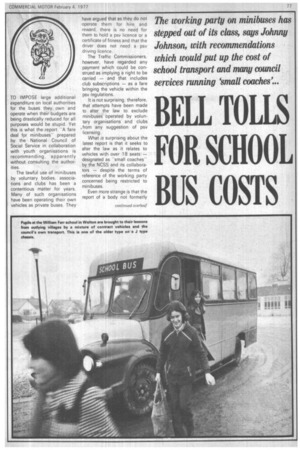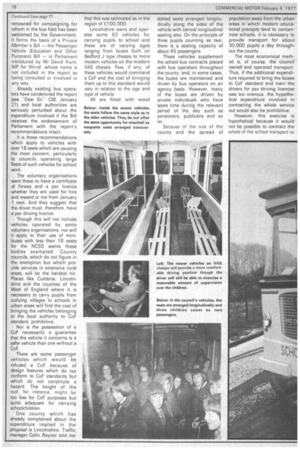TO IMPOSE large additional expenditure on local authorities for the
Page 79

Page 80

Page 81

If you've noticed an error in this article please click here to report it so we can fix it.
buses they own and operate when their budgets are being drastically reduced for all purposes would be stupid. Yet this is what the report "A fare deal for minibusesprepared by the National Council of Social Service in collaboration with youth organisations is recommending, apparently without consulting the authorities.
The lawful use of minibuses by voluntary bodies, associations and clubs has been a contentious matter for years. Many of such organisations have been operating their own vehicles as private buses They have argued that as they do not operate them for hire and reward, there is no need for them to hold a psv licence or a certificate of fitness and that the driver does not need a psv driving licence.
The Traffic Commissioners, however, have regarded any payment which could be construed as Implying a right to be carried — and that includes club subscriptions — as a fare bringing the vehicle within the psv regulations.
It is not surprising, therefore, that attempts have been made to alter the law to exclude minibuses operated by voluntary organisations and clubs .from any suggestion of psv licensing.
What is surprising about the latest report is that it seeks to alter the law as it relates to vehicles with over 18 seats — designated as "small coaches" by the NCSS and its collaborators -despite the terms of reference of the working party concerned being restricted to minibuses.
Even more strange is that the report of a body not formerly renowned for campaigning for reform in the bus field has been welcomed by the Government. It forms the basis of a Private Member's Bill — the Passenger Vehicle (Education and Other Purposes) Bill — in Parliament introduced by Mr David Hunt, MP for Wirral, whose name is not included in the report as being consulted or involved in any way.
Already existing bus operators have condemned the report (see -Dear SirCM, January 21) and local authorities are seriously perturbed about the expenditure involved if the Bill receives the endorsement of Parliament with the report's recommendations intact.
It is those recommendations which apply to vehicles with over 18 seats which are causing the most concern, particularly to councils operating large fleets of such vehicles for school work.
The voluntary organisations want these to have a certificate of fitness and a psv licence whether they are used for hire and reward or not from January 1 next. And they suggest that the driver must, therefore, have a psv driving licence.
Though this will not include vehicles operated by some voluntary organisations, nor will it apply to their use of minibuses with less than 18 seats for the NCSS wants these bodies exempted. County councils, which do not figure in the exemption but which provide services in extensive rural areas, will be the hardest hit. Places like Cumbria, Lincolnshire and the counties of the West of England where it is necessary to carry pupils from outlying villages to schools in urban areas will find the cost of bringing the vehicles belonging to the local authority to CoF standard, prohibitive.
Nor is the possession of a CoF necessarily a guarantee that the vehicle it concerns is a safer vehicle than one without a CoF.
There are some passenger vehicles which would be refused a CoF because of design features which do not conform to CoF standards, but which do not constitute a hazard. The height of the roof, for instance, might be too low for CoF purposes but quite adequate for carrying schoolchildren.
One county which has already complained about the expenditure implied in the proposal is Lincolnshire. Traffic manager Cohn Raynor told me that this was estimated as in the region of £100,000.
Lincolnshire owns and operates some 63 vehicles for carrying pupils to school and these are of varying ages ranging from buses built on Bedford J type chassis to more modern vehicles on the modern VAS chassis. Few, if any, of these vehicles would command a CoF and the cost of bringing them up to this standard would vary in relation to the age and type of vehicle.
All are fitted with wood slatted seats arranged longitudinally along the sides of the vehicle with central longitudinal seating also. On the principle of three pupils counting as two, there is a seating capacity of about 45 passengers.
These vehicles supplement the school bus contracts placed with bus operators throughout the county, and, in some cases, the buses are maintained and driven by bus operators on an agency basis. However, many of the buses are driven by private individuals who have spare time during the relevant period of the day such as pensioners, publicans and so on.
Because of the size of the county and the spread of population away from the urban areas in which modern educational precepts tend to concentrate schools, it is necessary to provide transport for about 30,000 pupils a day throughout the county.
The most economical method is, of course, the council owned and operated transport. Thus, if the additional expenditure required to bring the buses to CoF standard and train the drivers for psv driving licences was too onerous, the hypothetical expenditure involved in contracting the whole service out would also be prohibitive.
However, this exercise is hypothetical because it would not be possible to contract the whole of the school transport zo bus operators. There are simply not enough operators to take the job on and those who are in business do not have sufficient suitable vehicles to put on to the service at the relevant time.
Expensive
School work is hard on the vehicles, for obvious reasons, and it wou[d be a brave bus operator who would use an expensive modern vehicle for this purpose thus jeopardising excursion and tour business.
On an average estimate, the cost to the council of preparing a vehicle for a certificate of fitness test would involve about £900 a vehicle and the driver training to psv standard would cost about another E150 a driver. Plus the cost of the psv licence, the certificate of fitness and, possibly, the drivers' psv licences, this totals about £1,100 a vehicle. Adding the cost of additional hired vehicles when the council's own transport is off the road for the work to be done, there would be little change from £100,000 for converting the 60 plus vehicle fleet
Moreover, another Private Member's Bill which seeks to reduce the distance criteria for the provision of School tran, sport will increase the demand for vehicles and increase the cost of providing the service. This at a time when the
education budget in Lincolnshire has been reduced by £11/2 million.
Lincoln County Councd is replacing its older vehicles as they become due, but even the modern replacements will need substantial work to bring them to psv standard.
The Association of County Councils, which has not been involved in the preparation of the report and which was not even consulted, admits the financial implication and will be examining its provisions critically when it is printed. Undoubtedly it will be making representation about those provisions which involve its members in undue expendiLure.
































































































































